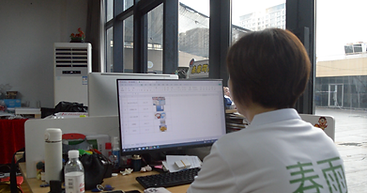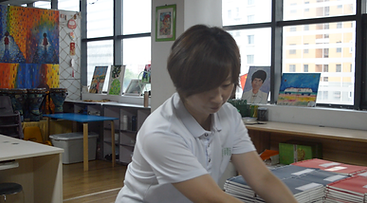
HX-Online Magazine 海翔个人期刊
From darkness to light: A woman’s life of service to the disabled
Lightening the burden: A disabled woman’s life of service to others



About the story
The story is about Chui Yonglan, a partially disabled woman, who has set up a school for disabled children and youth. Her school, Spring Rain shelters people with disabilities and also trains them with income-making skills.
Her passion to help has led to supporting many disabled children and youth become independent, thus bringing back to her stories of gratitude and selfless service.
The current situation of disabled people in China


-
Employment Growth: According to the China Disabled Persons' Federation (CDPF), from 2022 to 2024, a total of 1.648 million new jobs were created for urban and rural persons with disabilities. The employment rate for those of working age increased by 4.8 percentage points over these three years57.
-
"14th Five-Year Plan" Period Achievements: During the broader "14th Five-Year Plan" period (likely 2021-2025), cumulative新增 (new) urban and rural employment for persons with disabilities reached 2.31 million9.
-
Employment for University Graduates: The employment rate for university graduates with disabilities has remained high, staying above 85% for five consecutive years. In 2025, there were 31,842 such graduates49.
-
Policy Support and Expansion: The Chinese government is actively promoting employment. The newly released *Three-Year Action Plan for Promoting Employment of Persons with Disabilities (2025-2027)* aims to address key issues and involves more government departments for collaborative efforts57. Policy measures include urging government bodies and public institutions to take the lead in hiring persons with disabilities, developing more suitable job positions, and protecting their legal employment rights47.
Status of Persons with Brain Disabilities in China
-
Individuals with brain disabilities in China face severe systemic challenges. There is widespread discrimination in employment, with sustainable positions being limited to basic work. The existing vocational skills training is severely out of alignment with market demand, and most individuals are trapped in low-income informal employment or sheltered workshops, lacking avenues for income improvement.
The rehabilitation service system faces a prominent issue of fragmentation, with high-quality resources predominantly concentrated in urban areas, leaving rural regions lacking in basic service capabilities. 72% of households report catastrophic medical expenses due to rehabilitation costs not being covered by medical insurance, enduring immense economic pressure. Social discrimination remains deeply entrenched, with limited opportunities for community integration, while new technologies such as brain-computer interfaces still struggle to benefit the majority of the population due to cost and implementation barriers.
While Chinese individuals with brain disabilities face systematic challenges, there are also many positive developments emerging. At the policy level, the "14th Five-Year Plan" for the protection and development of persons with disabilities clearly sets quantitative indicators for strengthening the construction of the rehabilitation service system. Many local governments are gradually incorporating advanced rehabilitation technologies such as brain-computer interfaces into pilot medical insurance schemes. In the employment field, the rise of the digital economy has created new job opportunities such as remote annotation and cloud customer service. A leading technology company provided over 2,000 data annotation positions for individuals with disabilities in 2023.
Scientific and technological innovation is bringing breakthrough progress. The brain-computer interface system developed domestically has entered the clinical trial stage, successfully helping patients with spinal cord injuries to achieve basic motor function reconstruction. What is even more encouraging is the change in social attitudes - more and more enterprises have incorporated disabled employees into their formal employment systems. A well-known Internet company launched the "Integrated Employment Plan" in 2024, which has successfully placed more than 100 employees with brain disabilities. Community support networks are also constantly improving, with more than 500 "Homes for the Disabled" established nationwide to provide day care and vocational rehabilitation services.
Although these changes have not completely altered the overall predicament, they do indicate that society is moving towards a more inclusive and supportive direction. With the intensified implementation of policies, reduced technology costs, and enhanced social awareness, the development prospects for individuals with brain disabilities are gradually improving.
Introduction to Qingdao Chunyu Disability Assistance Employment Center
Cui Yonglan – Director of the Qingdao Chunyu Disabled Persons’ Supported-Employment Centre – is affectionately called “Mama Cui” by more than 200 young people with intellectual disabilities. At 25 she lost four fingers in a printing-press accident, but the tragedy never dimmed her zest for life. After founding her own printing company, she poured every yuan of her savings into launching “Chunyu” (Spring Rain) in 2014. Beginning in a rented 600-square-metre workshop, she has built a second home where people with intellectual, mental-health or severe physical disabilities receive training, paid work, rehabilitation and community.

Cui Yong lan
interviewee
philanthropist
Chunyu Disability Assistance Employment Center
 |  |  |
|---|---|---|
 |  |
Qingdao Chunyu Disability Assistance Employment Center is a pioneering social enterprise dedicated to empowering individuals with disabilities through vocational training and sustainable employment opportunities. Founded by Ms. Cui Yonglan, who herself experienced disability after a workplace accident, the center addresses critical gaps in inclusive employment by combining business operations with social mission.
video
-
About their story
volunteer
❤
Student
volunteer




video
Liu Xiao
Liu Xiao's name is almost synonymous with "spring". Three years ago, when she stepped through this door with her autistic son, perhaps even she herself didn't realize that this was not only the beginning of finding a nurturing environment for her son's growth, but also the "second spring" of the second half of her life.
A mother's "selfishness"
After Liu Xiao's son graduated from the special education center, like all parents of autistic children, she faced a seemingly unsolvable dilemma: "The child cannot stay at home every day, as that would completely isolate him from society." Therefore, driven by her "selfishness," she visited various disability assistance organizations, big and small, just to find a place where her son could stay comfortably.
Until he met Chunyu. When my son first stepped into this place, it was like a seed falling into fertile soil - he liked the atmosphere here, liked having familiar classmates, and even more so, liked the person in charge, affectionately known to the children as "Mama Cui". Autistic children are naturally wary of unfamiliar environments, but my son showed no sign of rejection at Chunyu, which finally put Liu Xiao's heart at ease.
From "taking care of children" to "taking care of children"
At first, Liu Xiao just accompanied her son to Chunyu every day, like an ordinary parent accompanying their child to school. But gradually, she realized that what was lacking here was not love, but people who "knew what they were talking about". Most of the parents, like her, were exhausted both physically and mentally by their children's illnesses, but they were struggling to find a solution. Liu Xiao, a mother who had been fighting against autism for her child for more than a decade, had already explored a set of passwords to get along with children like stars through countless breakdowns and reconstructions.
So, she made a decision: to stay and become Chunyu's teacher. From then on, she had two identities - the mother of her son and "Teacher Liu Xiao" shared by dozens of children.
Student
video
Zhou Simiao (nicknamed Miaomiao), 33 years old, enjoys playing the piano, singing, and traveling. Introduced by the Disabled Persons' Federation, she arrived at the Chunyu Disabled Persons' Assistance Center. Upon learning that she had a passion for the piano, the center's director, affectionately known as "Mama Cui," specially invited a teacher for her. She holds a deep gratitude towards Mama Cui, expressing her appreciation "for a lifetime.".
Zhou SImiao(Miao miao)